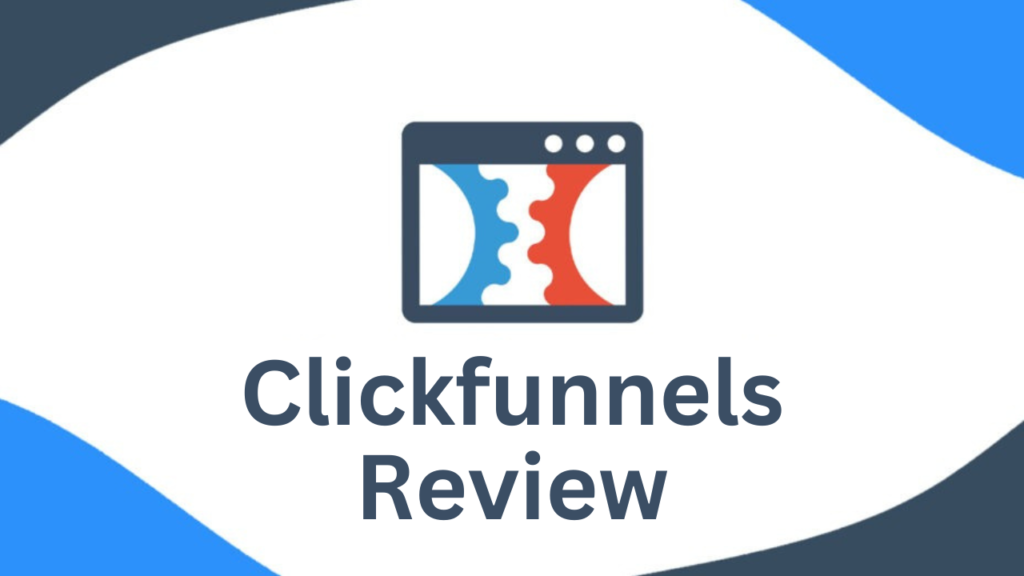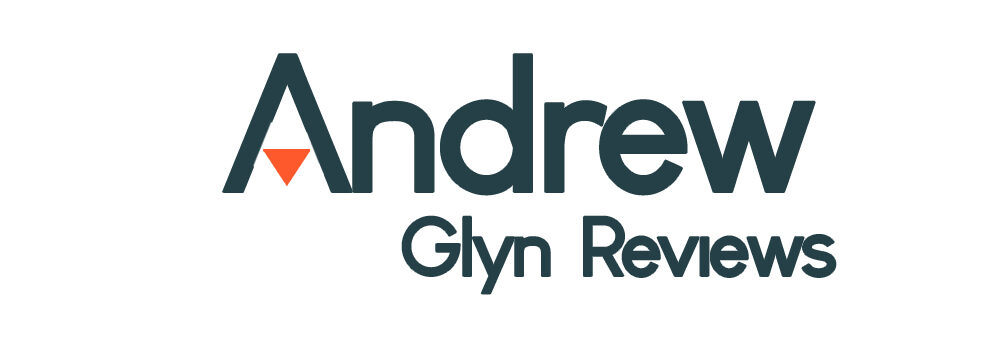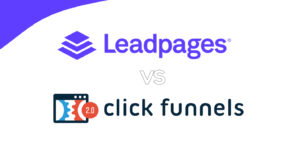
Navigating the choice between ClickFunnels vs ConvertKit can be a challenge for digital marketers. This blog post delves into a comprehensive comparison of these two leading platforms, dissecting their features, pricing, pros and cons, and more. Whether you’re building sales funnels or mastering email marketing, this guide will help you make an informed decision.
Table of Contents
Quick Comparison: ClickFunnels vs ConvertKit
In the digital marketing arena, ConvertKit vs ClickFunnels serve distinct purposes. ClickFunnels excels in creating comprehensive sales funnels, ideal for businesses seeking to streamline their online sales process. It offers a robust platform for building, customizing, and optimizing various types of marketing funnels.
On the other hand, ConvertKit caters primarily to content creators and marketers focusing on email marketing and audience engagement. It shines with its user-friendly interface and powerful tools for email automation, segmentation, and subscriber management. While ClickFunnels is more suited for sales-driven strategies, ConvertKit is the go-to for nurturing subscriber relationships through targeted email campaigns.
What is the pricing like for ClickFunnels vs ConvertKit?
When comparing ClickFunnels vs ConvertKit, one of the critical aspects to consider is their pricing structure. Understanding how each platform charges for its services will help you decide which tool aligns better with your budget and business needs. Let’s delve into the pricing details of ClickFunnels vs ConvertKit, focusing on what each plan offers.
ClickFunnels Pricing
ClickFunnels offers a tiered pricing system designed to cater to businesses of different sizes and needs. As of my last update, their pricing is as follows:
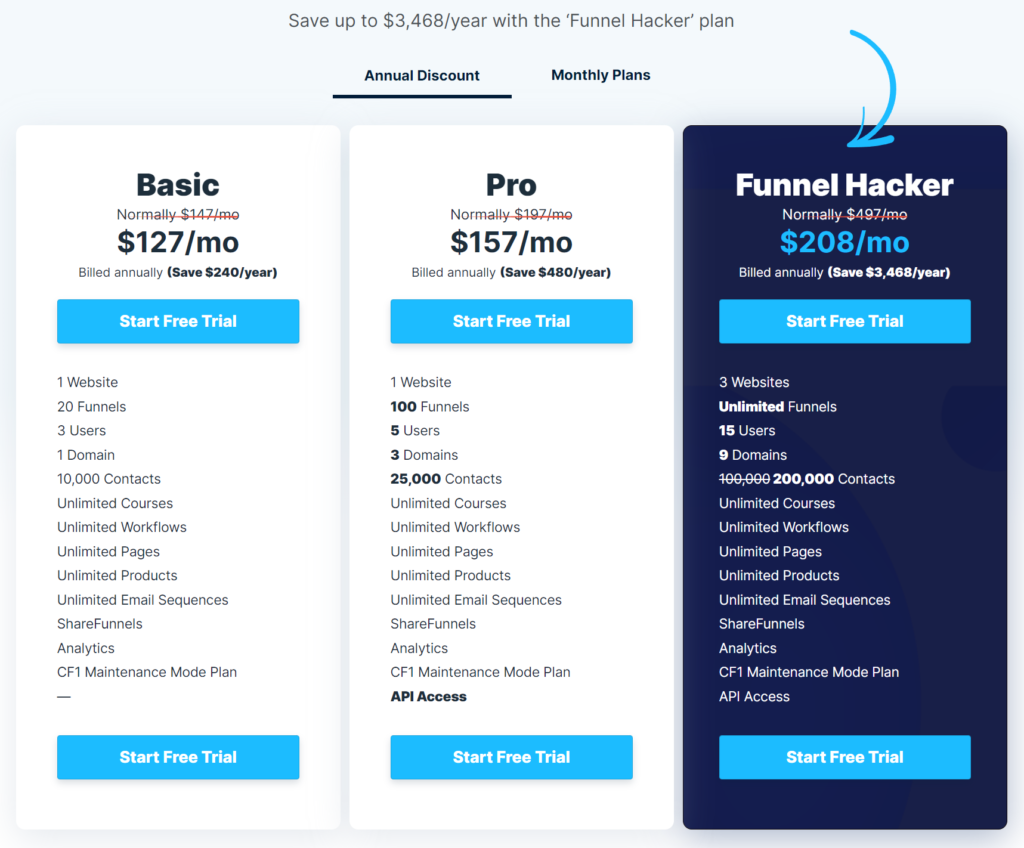
Basic Plan Price: $147 per month. Features: This plan includes access to all the basic funnel creation tools, 20 funnels, 10,000 Contacts, 3 user, 1 Domain, and Unlimited Email Sequences. It’s ideal for small businesses or individuals starting out with funnel building.
Pro Plan Price: $197 per month. Features: This plan expands significantly on the Basic Plan, offering 100 funnels, unlimited pages, 5 users, 25,000 Contacts, API Access and 3 domains.
Funnel Hacker Plan Price: Around $297 per month. Features: Unlimited Funnels: Unlike the basic plan, the Funnel Hacker Plan allows you to create an unlimited number of sales funnels, 3 Websites, 15 Users, 9 Domains, 200,000 Contacts, API Access and CF1 Maintenance Mode Plan
Read more
- ClickFunnels do offer a TwoCommaClubX Plan: Price: Around $2,497 per month Features: Designed for large-scale businesses, this plan includes everything in the Platinum Plan plus more. It offers unlimited funnels, pages, users, payment gateways, and domains, along with priority support and additional training and courses.
ConvertKit Pricing
ConvertKit, renowned for robust email marketing and automation, offers versatile pricing options catering to diverse business sizes and needs.
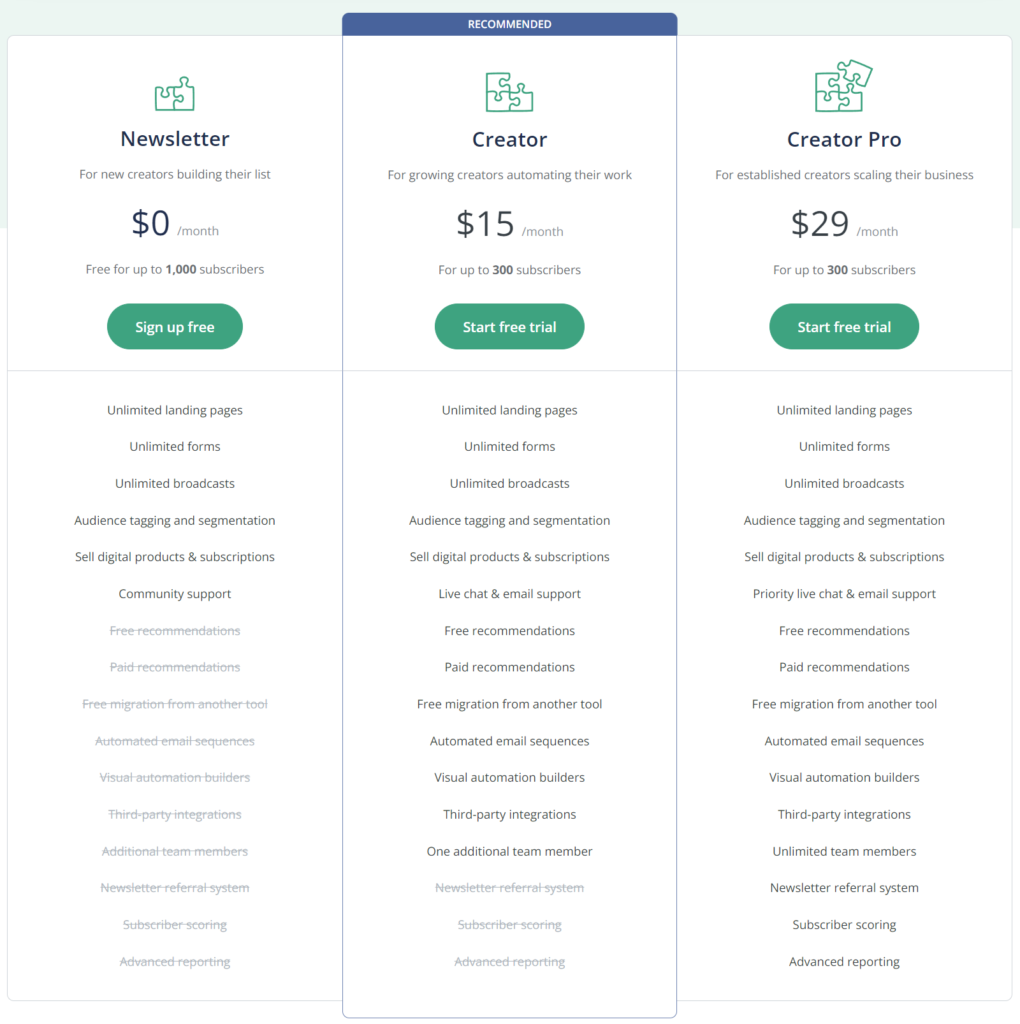
Newsletter Plan Price: $0 (Free). Features: The Newsletter plan supports up to 1,000 subscribers and includes Unlimited landing pages, and forms, Unlimited forms, Unlimited broadcasts & More, It’s a great starting point for new businesses or individuals.
Creator Plan Price: Starting at $15 per month for up to 300 subscribers, This plan includes everything in the Newsletter Plan with additional features like Live chat & email support, Free recommendations, Paid recommendations, Free migration from another tool, Automated email sequences and More, (price increases with more subscribers)
Creator Pro Plan Price: Starting at $29 per month for up to 300 subscribers This includes everything in the Creator Plan, with additional features like advanced reporting, subscriber scoring, and advanced deliverability reporting and Unlimited team members (price increases with more subscribers).
Read more
Price Increases With More Subscribers Added



It’s important to note that both ClickFunnels and ConvertKit offer annual payment options that can provide a discount compared to the monthly subscription.
Features Comparison: ClickFunnels vs ConvertKit
When deciding between ClickFunnels vs ConvertKit, it’s vital to comprehend the unique features each offers. ClickFunnels excels in creating diverse, effective sales funnels, making it ideal for businesses focused on direct online sales. ConvertKit, on the other hand, specializes in email marketing, offering powerful tools for subscriber engagement and automation, perfect for content creators and marketers. This detailed comparison aims to illuminate the strengths and functionalities of each, aiding in choosing the tool that aligns best with your marketing objectives. we have listed all features Below for ClickFunnels and ConvertKit
ClickFunnels Features
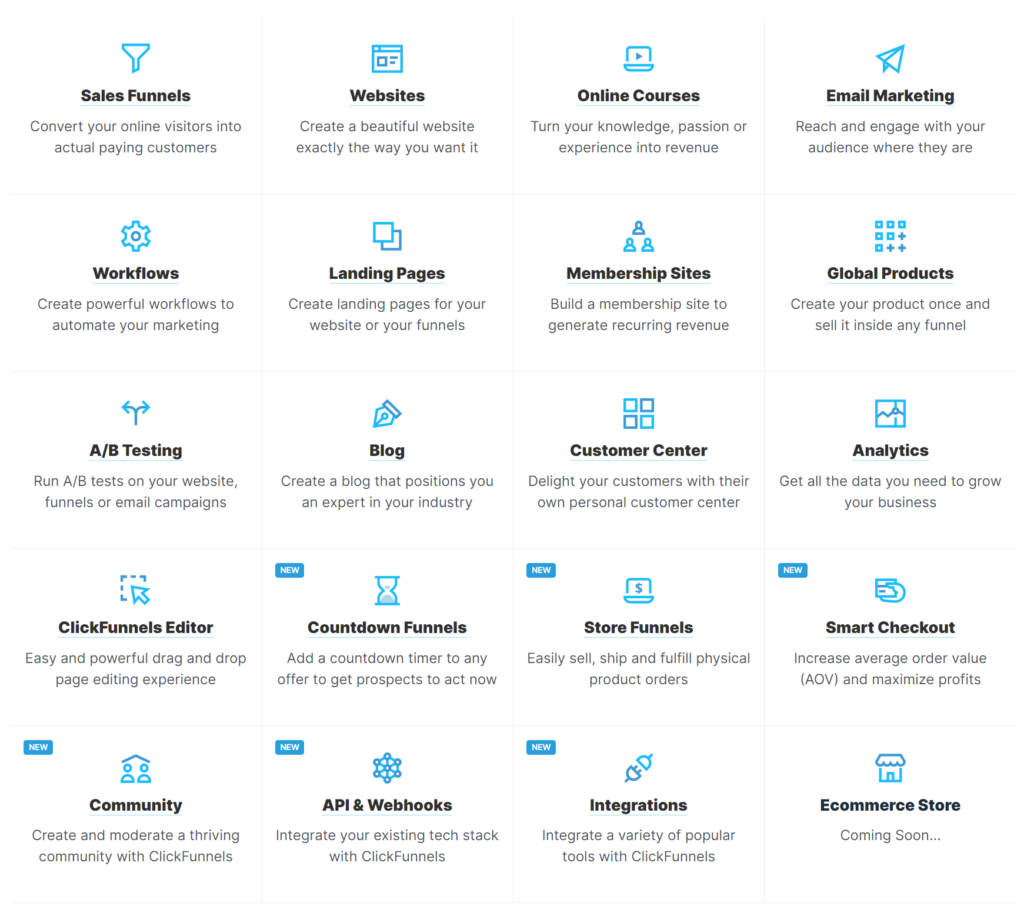
ConvertKit Features
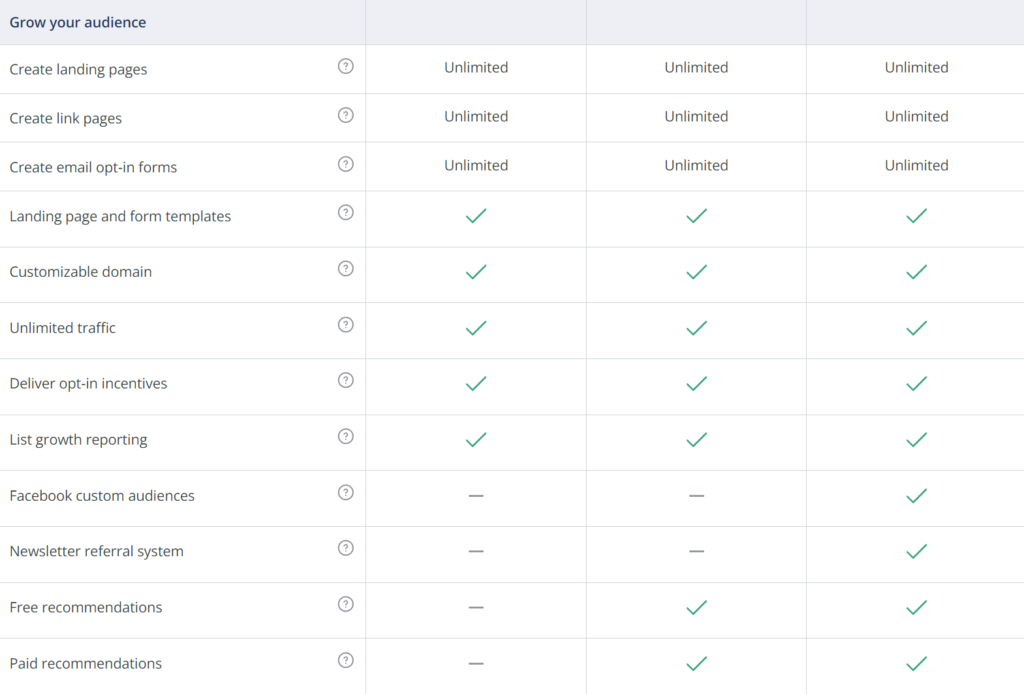
Read more
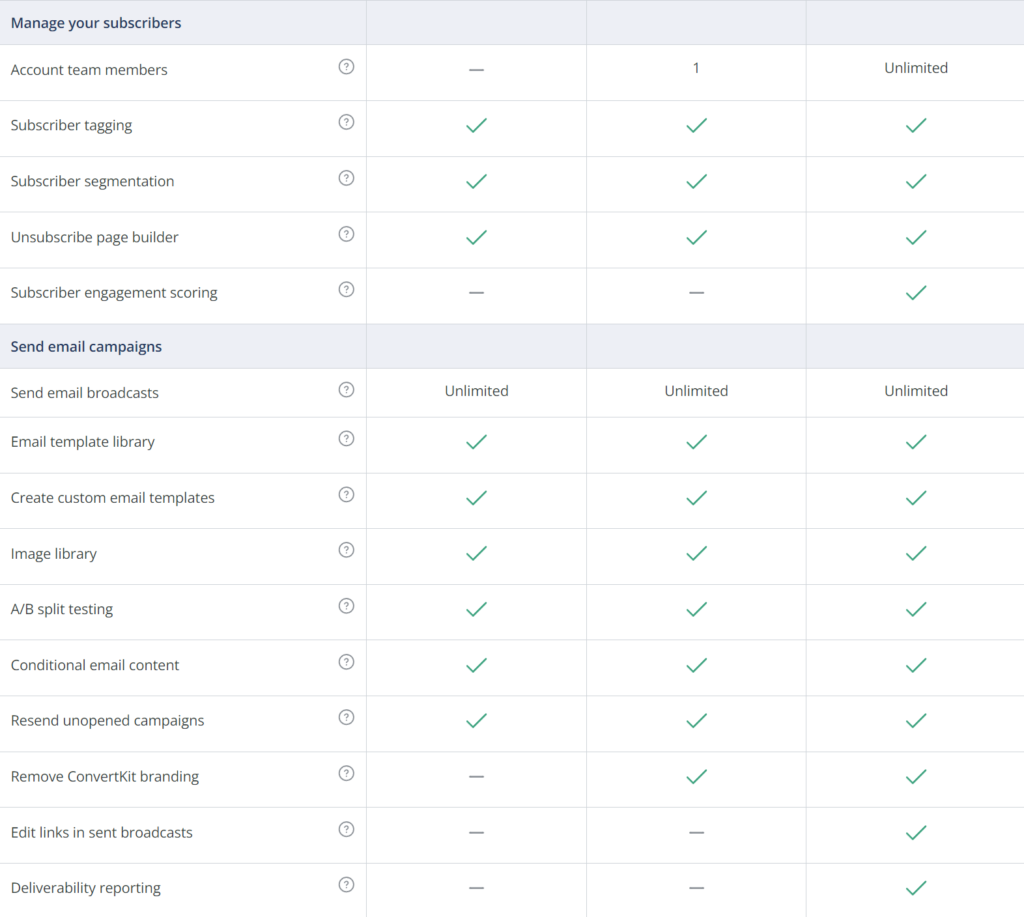
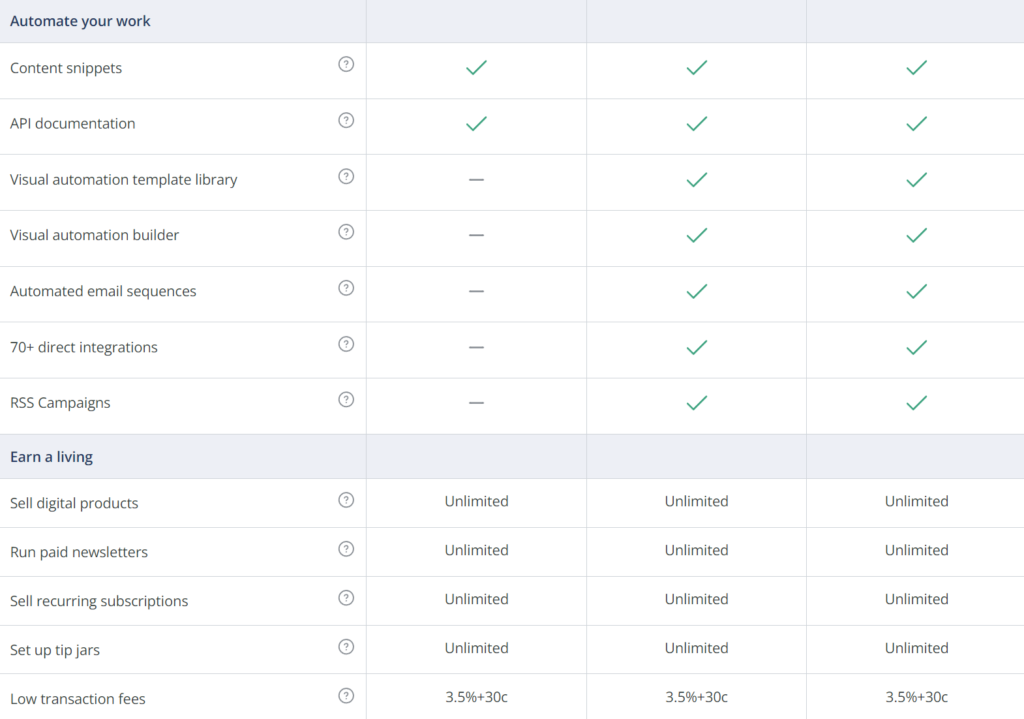

The Pros and Cons ClickFunnels vs ConvertKit
When comparing ClickFunnels vs ConvertKit, each platform has its own set of advantages and limitations. Understanding these can help you make an informed decision based on your specific marketing needs.
ClickFunnels: Pros and Cons
Pros
- Comprehensive Sales Funnel Builder: Offers a wide range of options for creating and managing diverse sales funnels.
- All-in-One Platform: Integrates various functionalities like web hosting, landing page design, and email automation.
- User-Friendly Interface: Features an intuitive drag-and-drop editor, making it easy for non-technical users.
- Robust Marketing Features: Includes A/B testing, affiliate management, and detailed analytics.
- Community and Support: A large community of users and accessible customer support.
Cons
- Higher Price Point: More expensive compared to ConvertKit, potentially a barrier for small businesses or startups.
- Focus on Funnels: Primarily focused on sales funnels, which might be more than what’s needed for simple email marketing campaigns.
- Learning Curve: While user-friendly, mastering all the features can take time.
ConvertKit: Pros and Cons
Pros
- Email Marketing Focus: Excellent for businesses prioritizing email marketing and audience engagement.
- Ease of Use: Simple and clean interface, ideal for beginners and those who prefer straightforward tools.
- Automation and Segmentation: Advanced features for automating email campaigns and segmenting audiences.
- Creator-Friendly Platform: Particularly beneficial for content creators, bloggers, and online educators.
- Free Plan Available: Offers a free plan for up to 1,000 subscribers, making it accessible for new businesses.
Cons
- Limited in Sales Funnel Functionality: Not as robust as ClickFunnels in terms of sales funnel creation and management.
- Basic Landing Page Capabilities: The landing page builder is simpler and may not meet the needs of users looking for complex designs.
- Lesser Features for Price Tiers: Compared to ClickFunnels, some plans may offer fewer features at similar price points.
Read more
- In the ClickFunnels vs. ConvertKit comparison, ClickFunnels stands out for its comprehensive sales funnel capabilities, suited for businesses looking to build complex sales processes online. On the other hand, ConvertKit excels as an email marketing platform, ideal for content creators and businesses focusing on growing and engaging their audience. Your choice should align with your specific marketing goals and the scale of your operations.
Alternatives ClickFunnels vs ConvertKit
While ClickFunnels and ConvertKit are popular choices in their respective domains of sales funnels and email marketing, there are several other tools in the market that can be considered as alternatives. Let’s explore some of these options, which might better align with your specific needs or budget constraints
Alternatives to ClickFunnels

Focus: Primarily on landing pages but also offers some sales funnel capabilities.
Advantages: More affordable with a focus on high-converting landing pages.
Limitations: Less comprehensive in funnel management compared to ClickFunnels.
To learn more about Leadpages, we recommend that you read this Clickfunnels vs Leadpages

Focus: A comprehensive digital marketing platform offering a range of tools.
Advantages: Includes website building, funnel creation, and email marketing in one platform.
Limitations: Can be overwhelming due to the sheer number of features.
To learn more about Builderall, we recommend that you read this Builderall Review

Focus: All-in-one platform for online marketing, similar to ClickFunnels.
Advantages: Provides a suite of marketing tools including email marketing, hosting, and memberships.
Limitations: Might be on the pricier side for startups or small businesses.
Alternatives to ConvertKit

- Focus: Email marketing with added marketing automation features.
- Advantages: User-friendly interface, free tier available, and good for small to medium-sized businesses.
- Limitations: Automation workflows are less sophisticated compared to ConvertKit.
To learn more about Mailchimp, we recommend that you read this Mailchimp vs MailerLite

- Focus: Email marketing and CRM for small to midsize businesses.
- Advantages: Powerful automation and CRM integration.
- Limitations: Can be complex to set up and manage.
To learn more about ActiveCampaign, we recommend that you read this ActiveCampaign vs TinyEmail

- Focus: Email marketing services targeting small businesses.
- Advantages: Easy to use with straightforward email marketing tools.
- Limitations: Lacks some of the advanced features of ConvertKit.
While ClickFunnels and ConvertKit are powerful tools in their own right, these alternatives offer different features and pricing structures that may be more suitable for certain businesses. Whether your priority is a comprehensive all-in-one solution, affordability, or specific features like advanced automation or CRM integration, there is likely a tool out there that meets your requirements. Assessing your business needs and budget will guide you in choosing the right alternative to ClickFunnels or ConvertKit.
Security and Reliability ClickFunnels vs ConvertKit
When it comes to digital marketing tools, the security and reliability of the platforms are crucial. Both ClickFunnels and ConvertKit recognize the importance of these factors and have measures in place to ensure user data is protected and their services are consistently available.
ClickFunnels: Security and Reliability
Data Security: ClickFunnels takes data security seriously, implementing robust encryption and security protocols to protect sensitive information, Regular security audits are conducted to identify and rectify potential vulnerabilities.
Uptime and Reliability: Maintains a high uptime rate, ensuring that sales funnels and landing pages are always operational, The platform has a reliable infrastructure that can handle high traffic volumes without significant downtimes.
Compliance: Adheres to various compliance standards, including GDPR, to ensure users’ data collection practices are legal and secure.
Backup and Data Recovery: Regular backups of data are performed, minimizing the risk of data loss and Offers contingency plans for quick recovery in case of any data breach or loss.
ConvertKit: Security and Reliability
Data Protection: ConvertKit employs strong encryption methods for data protection, ensuring that user and subscriber information is secure, Regular updates and patches are applied to safeguard against emerging security threats.
System Uptime: Boasts a commendable uptime record, meaning your email campaigns and subscriber lists are reliably accessible, Invests in scalable infrastructure to manage growing numbers of users and data loads.
Compliance with Regulations: Fully compliant with international data protection laws, including GDPR, giving users confidence in their data handling practices.
Data Recovery and Support: Implements effective backup strategies for data security, Provides robust support for any issues related to data integrity or platform functionality.
Conclusion: Who is the Winner in ClickFunnels vs ConvertKit?
Determining a clear winner in the ClickFunnels vs ConvertKit debate isn’t straightforward, as the best choice largely depends on your specific business needs and goals. Both platforms offer distinct strengths and cater to different aspects of online marketing.
ClickFunnels: The Ideal Choice for Sales Funnels
Read more
ClickFunnels excels in creating and managing sales funnels. It’s the go-to tool if your primary goal is to build effective sales funnels that convert visitors into customers. Its robust set of features for funnel creation, management, and optimization make it a top choice for businesses focused on direct sales and marketing.
ConvertKit: Tailored for Email Marketing and Audience Building
Read more
ConvertKit is more specialized in email marketing and audience engagement. It’s the better option for content creators, bloggers, and businesses whose main focus is on growing and nurturing their subscriber list. The platform’s user-friendly interface and powerful automation capabilities make it ideal for targeted email campaigns and effective subscriber management.
Making the Right Choice
- Business Focus: If your primary need is building and optimizing sales funnels, ClickFunnels is likely the better choice. Conversely, if email marketing and audience engagement are your top priorities, ConvertKit should be your go-to tool.
- Budget Considerations: Also consider your budget. ClickFunnels generally comes with a higher price tag, which might be a significant factor for startups or small businesses.
- Long-Term Goals: Think about your long-term marketing strategy. Your choice should align not just with your current needs, but also where you plan to take your business in the future.
The Verdict
There isn’t a one-size-fits-all answer to the ClickFunnels vs ConvertKit question. Each platform serves different needs and excels in its own right. Evaluate your business’s specific requirements, budget constraints, and long-term marketing strategy to make the best decision. Ultimately, the winner is the tool that aligns most closely with your business objectives and aids you in achieving your digital marketing goals.
What is clickfunnels?
To learn more about Clickfunnels, we recommend that you read this Clickfunnels Review
